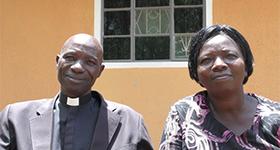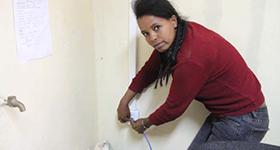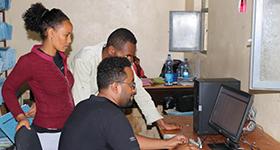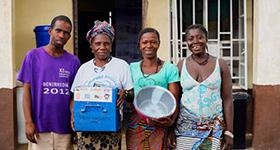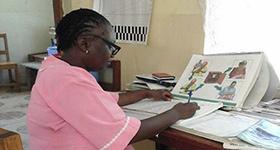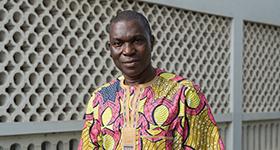Background
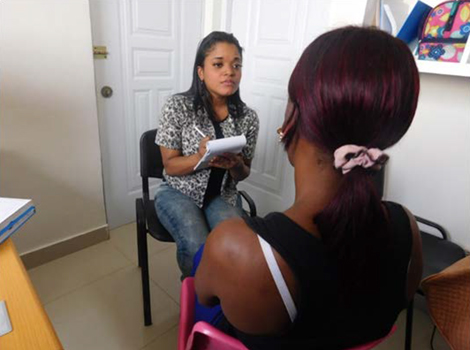
Amalis being interviewed by Rosa Margarita Aybar, APC Program Officer
Amalis and Kissairys are two sex workers in the Dominican Republic. They were introduced to HIV care through the Center for Comprehensive Orientation and Investigation's (COIN, in Spanish) mobile clinic.
"I got tested for HIV because a colleague knew that I had been raped by two clients. My colleague took me to one of the community outreach activities organized by COIN. I was afraid of getting tested, since there were rumors that one of my rapists was HIV positive. I didn't even wait for the results. It was not until a health promoter went to my house to talk to me in private about the importance of knowing my status that I decided to face the outcome," says Amalis, who is 37 years old.
In the Dominican Republic, HIV prevalence is much higher among sex workers than the general population. While HIV prevalence among the general population has remained stable at 0.8 percent since 20071, among sex workers it is estimated at 4.5 percent2.
Sex workers, along with men who have sex with men (MSM) and transgender people, are classified as key populations because they are at high risk of contracting and transmitting the HIV virus. As part of the global strategy to reach the 90-90-90 goals and to control the HIV and AIDS epidemic in the Dominican Republic, access to comprehensive HIV services by key populations is critical.
COIN is a partner organization of the Advancing with Partners and Communities (APC) project, which is implemented by JSI Research & Training Institute, Inc. (JSI) with funding from the United States Agency for International Development (USAID). The project aims to expand key populations' access to high-quality comprehensive HIV services. Thanks to the efforts of COIN and other APC-supported local partners, 5,561 sex workers were tested for HIV between October 2015 and March 2016.
Intervention
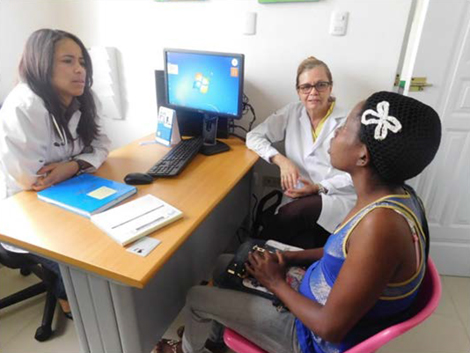
Kissairys receives comprehensive care at the COIN clinic
Amalis and Kissairys say that the information about the importance of going to the outreach clinics that recruiters and health promoters gave them helped them decide to get tested. "For me, it was important that the person that contacted me assure me that the test is confidential and if the result was positive, COIN would provide me with ongoing care and support," says Amalis. Kissairys, who is 26, says she also got tested in one of the outreach clinics managed by COIN because, "a promoter invited me to an outreach activity and I decided to attend because I was curious to see all the people who were participating."
In the first half of 2016, COIN provided HIV testing to 1,087 sex workers in Santo Domingo, of whom 39 (3.5 percent), including Amalis and Kissairys, were HIV positive. The HIV prevalence among sex workers in Santo Domingo is 1.7 percent. Therefore, identifying 3.5 percent HIV positive among the sex workers tested indicates a good yield.
A determining factor in the percentage of HIV-positive cases of sex workers identified by COIN was the implementation of the social network strategy (SNS).The APC project trained its partners to implement an SNS, which focuses on reaching people at high risk of contracting HIV through existing social networks. People who are high risk are identified and approached by ‘recruiters' who are HIV-positive or high-risk negative people themselves. Recruiters guide the beneficiaries to HIV testing and counseling services and refer them to health services.
Mariluz Martinez, coordinator of prevention services at COIN, says that her organization has integrated other strategies that have facilitated the positivity of HIV testing services for sex workers at the community level, such as:
- Mapping3 areas where COIN is most likely to reach HIV positive people who engage in high risk behaviors.
- Setting flexible schedules tailored to accommodate the needs of key populations who participate in the outreach testing activities.
- Changing the approach to HIV outreach by focusing on traditional and nontraditional open spaces in which transactional sex is present.
- Focusing on key populations according to their risk behaviors.
Outcomes
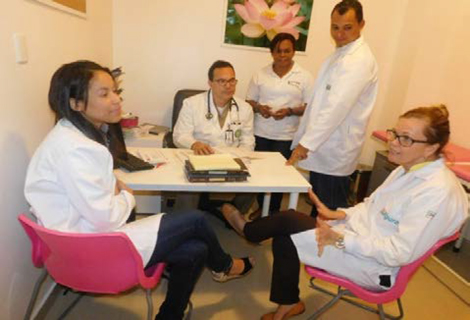
Internal consultation team at the COIN clinic
Amalis and Kissairys were enrolled in the comprehensive care services offered by COIN. Each of them now has access to a full package of medical tests including CD4 count and viral load; antiretroviral therapy services; prevention, diagnosis, and treatment of STIs; gynecology; sonography; and mental health.
Amalis, as a victim of violence, receives special counseling from Dr. Mayra Rodriguez, a psychologist who is in charge of the mental health team, and home visits from the social work team. "At COIN they treat me well and have encouraged me. They are by my side. Once, when I was admitted to the hospital due to other health problems, the social workers from COIN accompanied me and then took me home," recalls Amalis.
Dr. Mayra Rodriguez highlights a best practice which is internal consultations that are coordinated by a team of COIN health providers—such as the general physician, the psychologist, the urologist and the gynecologist—to determine care and the follow up for each patient. "We have a guide and a protocol for patient visits," says Dr. Rodriguez.
In addition, COIN offers sex workers and other key populations free legal assistance through its Observatory for Human Rights working group. This type of service provides the opportunity for victims of abuse to exercise and defend their rights, and fosters an environment that helps ensure the effectiveness of the HIV program.
Lessons
The percentage of HIV-positive sex workers identified by COIN in Santo Domingo is a result of different strategies, including the use of key messages to inform sex workers about the importance of getting an HIV test. This and other strategies were developed based on a series of recommendations derived from APC supported focus groups.
Lastly, the strategies implemented by COIN show the importance of enrolling people who are newly diagnosed with HIV in care immediately; rapid initiation of antiretroviral treatment; and access to comprehensive care services including mental health for handling cases of gender-based violence, and social work services to meet the needs of people who live with HIV and are home-bound.
1 Demographic and Health Survey conducted in 2013 2 Second Survey of Behavior Surveillance with Serological
2 Second Survey of Behavior Surveillance with Serological Linking 2012
3 Mapping was conducted through the Priorities for Local AIDS Control Efforts (PLACE) study in 2014 and information collected by partner organizations working in the area.

